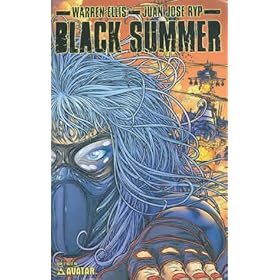
America's superheroes take on preemptive war, torture, warrantless spying, and George W. himself.
A superhero killed the president this summer. Moments later, a shocked White House press corps watched as John Horus, his gleaming white-and-gold costume still soaked in blood, explained why. Because "the war in Iraq is illegal and predicated on lies," because "our people and theirs are dying for corporate gain," because of the "use of torture by our elected authorities," and because the president "stole the last two elections," the most powerful member of the Seven Guns could no longer "stand by while this administration commits crimes." In response, a terrified government imposed martial law, launching a nationwide manhunt for Horus' estranged teammates, whose reactions to the act ranged from horror to sympathy.
That bit of propaganda-by-the-deed launched acclaimed British scribe Warren Ellis' Black Summer, an eight-issue comic book miniseries from Avatar Press. And though heroes at industry giants DC Comics and Marvel have shown more restraint -- even after Superman's Lex Luthor won the Oval Office in 2000 -- the post–September 11 era has seen an explosion of politically themed storylines in mainstream as well as independent comics. While real-world presidential candidates invoke supercop Jack Bauer, of the TV series 24, as a guide to national security policy, a more nuanced debate about preemptive war, warrantless surveillance, and the responsibility that comes with great power is taking place in an illustrated universe.
In one sense, this is nothing new. The very first issue of Captain America (1941) showed the star-spangled super-soldier punching out Adolf Hitler, prompting criticism from both Nazi sympathizers and those who considered der Führer Europe's problem. Superman and Batman hawked war bonds while facing down monstrous racist caricatures of buck-toothed Japs. Frank Miller's Batman: The Dark Knight Returns and Alan Moore's Watchmen -- works that transformed comics in 1986 by proving that illustrated tales of men in tights could be serious, adult art -- were both steeped in their Cold War milieu. (Moore took his title from the Roman poet Juvenal's famous query about political power: "Who watches the watchmen?")
ctd at The American Prospect



1 comment:
Meanwhile Frank Miller is supposedly writing a story about Batman finding Bin Laden, but I haven't heard about that for a while.
Warren Ellis is great. Total A-list writer, just like Miller and Moore in their day.
Post a Comment